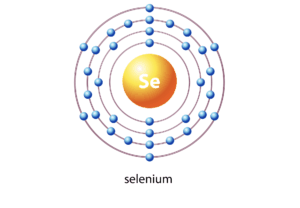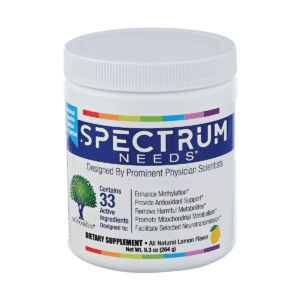$84
Selenium
Selenium is a trace mineral that is part of the amino acid selenocysteine, which is part of several enzymes in energy metabolism, and in defenses against free radical damage and inflammation. Selenium deficiency is rare, but can be seen in people on TPN. Selenium deficiency can lead to muscle, neurological, immunological, skin, nail, hair, and thyroid dysfunctions. Its role in the treatment of autism is not well studied, however, children with ASD often have diets that are relatively deficient in many trace minerals, including selenium. Some studies suggest that consuming plenty of selenium has positive antiviral effects, and also reduces the risk of heart disease, cancer, infertility, cognitive decline, autoimmune and thyroid diseases. Side effects are rare at usual doses used in supplementation.
 Selenium in Spectrum Needs
Selenium in Spectrum Needs
Selenium is added in order to provide a wide basis of nutrition, especially given the important role of selenium in energy metabolism. Side effects are unexpected.
Selenium is a mineral that must be obtained in the diet and is required in trace amounts.
While many sources state that 20 different amino acids comprise proteins, there is at least one additional amino acid, selenocysteine, which includes selenium. Selenocysteine is present in many proteins, including several enzymes in energy metabolism, and in defenses against free radical damage and inflammation.
Selenium deficiency is rare, but can be seen in people on TPN who are inadequately supplemented and those who grow their own food in areas with selenium-deficient soil. Selenium deficiency can lead to muscle, neurological, immunological, skin, nail, hair, and thyroid dysfunctions.
Selenium is a necessary trace dietary component. However, its role in the treatment of autism is not well studied. Children with ASD often have diets that are relatively deficient in many trace minerals, including selenium (https://www.ncbi.nlm.nih.gov/pubmed/28074329). While results differ among studies, there is some evidence of lower selenium levels in the hair and nails of children with ASD (https://www.ncbi.nlm.nih.gov/pubmed/20625937).
One study from Saudi Arabia suggested that selenium is lower in children with autism, and supplementation helps decrease the increased heavy metals (lead and mercury) found in those children (https://www.ncbi.nlm.nih.gov/pubmed/28326463).
Some studies suggest that consuming plenty of selenium has positive antiviral effects, and also reduces the risk of heart disease, cancer, infertility, cognitive decline, autoimmune and thyroid diseases.
What Are the Common and/or Important Side Effects? Side effects are rare at usual doses used in supplementation.
Laboratory testing can reveal the presence of a selenium deficiency, and this test is indicated in specific situations where selenium deficiency is likely or suspected.
How and why Selenium is used in Spectrum Needs
Order SpectrumNeeds Today
Formulations









 Selenium in Spectrum Needs
Selenium in Spectrum Needs